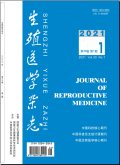生殖医学杂志2024,Vol.33Issue(7):878-884,7.DOI:10.3969/j.issn.1004-3845.2024.07.006
肾移植受者术后妊娠14例临床病例分析
Clinical analysis of 14 pregnancies in women with renal transplantation
摘要
Abstract
Objective:To explore the optimal time of pregnancy,prenatal management and pregnancy outcomes in renal transplant recipients. Methods:We retrospectively collected the clinical data of 14 pregnant women with renal transplantation from June 2017 to June 2023,who had regular prenatal examination and underwent follow up in Beijing Chaoyang Hospital Affiliated to Capital Medical University.The optimal interval between renal transplantation and conception,medication use during pregnancy,maternal complications,the optimal time of termination of pregnancy,and maternal and fetal outcomes were evaluated. Results:All of the fourteen patients received allogeneic kidney transplantation.The average maternal age was(34.2+3.2)years(ranged from 30 to 40 years).The average interval between kidney transplantation and conception was(7.6+3.9)years(ranged from 3 to 17 years).Except one patient who was suggested terminating pregnancy due to abnormal renal function in the first trimester pregnancy,the other 13 patients delivered until second or third trimester under strict monitoring and obtained live births.Among those with successful pregnancy,nine women(69.2%)were treated with tacrolimus+mizoribine+prednisone regimen during pregnancy,three(23.1%)with tacrolimus+azathioprine+prednisone regimen,and one(7.7%)with cyclosporine A+mizoribine+prednisone regimen.The average gestational age was(34.6±3.2)weeks(ranged from 26+5 to 37+5 weeks).There were nine patients(69.2%)suffering premature birth,and term births were found in four patients.Among those with premature birth,the termination of pregnancy was conducted due to the progress of preeclampsia(n=5),the deterioration of renal function at 34 weeks(n=1),acute fetal distress displayed by abnormal fetal heart monitoring at 34+6 weeks(n=l)and spontaneous preterm labor at 36+5 weeks and 26+5 weeks(n=2).Twelve patients(92.3%)delivered by cesarean section,and reported live births.None experienced acute rejection or the graft loss as a result of pregnancy. Conclusions:The risks of pregnancy-induced hypertension and preterm delivery are high in renal transplant recipients.Most of them could achieve favorable pregnancy outcomes by the tight monitoring of multidisciplinary cooperation during pregnancy.关键词
肾移植/妊娠/免疫抑制剂/妊娠结局Key words
Kidney transplantation/Pregnancy/Immunosuppressant/Pregnancy outcome分类
医药卫生引用本文复制引用
梁兵,龚丽云,张智伟,刘航,路军丽..肾移植受者术后妊娠14例临床病例分析[J].生殖医学杂志,2024,33(7):878-884,7.基金项目
国家重点研发计划(2021YFC2700705) (2021YFC2700705)

